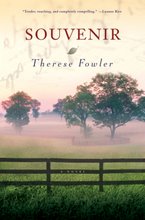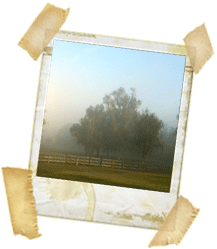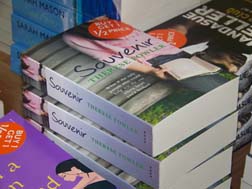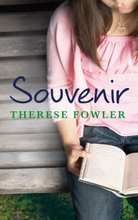Therese Fowler's debut novel, Souvenir, will be released in the United States on February 26, 2008 and in the United Kingdom on July 2, 2007. She writes in her sunroom in North Carolina. When not absorbed in writing her second novel, she shares her publishing journey and thoughts on craft with fellow readers and writers on her blog.
1.Souvenir hits the shelves on February 26, 2008 for your publishing debut. Getting that first sale, especially to a large publishing house, is a big rung in a novelist's career. How did you feel when you learned that Souvenir sold to Random House? Did you hoist an “I made it” flag in your writing room? Were you glad Souvenir sold to a large publishing house?
Two days before my agent, Wendy Sherman, sent Souvenir out to editors, she told me she anticipated a “big” sale. Though I do trust her opinion, such a sale really seemed too much to hope for. I'd literally never published a thing and there she was saying words like “big” and “sale” in a sentence that was about my novel and not, say, Macy's. Unreal.
Souvenir went out on a Thursday, and on Monday my agent called and said, “You're the talk of the town, sweetheart!” I started crying. We had preemptive deals in Germany and Italy already, and later in the day a great initial offer from Random House—which my agent turned down!

I panicked when she told me. “What if they change their minds?!” Very naïve of me—they don't ever change their minds at that stage. She patiently explained this and said that several other publishers were interested and that she was holding an auction. Auction. It's THE magic word for aspiring authors, isn't it?
Throughout that week I spoke with several editors, all of whom I'm sure would have been great choices. However, I was delighted when Random House bested the other offers, not so much because it was RH but because I really, really liked the editor and her vision for the book (and now that I've worked with her I like her even better!).
I don't know that being published by a large house is necessarily an advantage; think of Charles Frazier with Cold Mountain and Grove/Atlantic. What matters most is the publisher's commitment to the book.
An “I made it” flag is a great idea but I'm not sure I'm qualified to fly one just yet!
2.Though Souvenir will be your first published novel, it's the third novel you've written. How did the first two novels help you get to where you are today?
The first novel I wrote was a proving ground for me. Since I'd only ever written one story start-to-finish before trying the novel (and a pretty short story at that), I had no idea whether I could actually write anything so extensive. It turned out I could, which in itself was significant. That's the first step, right? Though I didn't secure an agent or publisher for that novel, the feedback I got from those who were initially interested was very encouraging.
I could have revised that novel. The most interested of the agents actually called me to discuss why she thought it wasn't yet ready, and was willing to read it again if I revised. But by then I was pretty sure I didn't want that novel to be “it” for me after all. I was already considering grad school, and I wanted to write something not just better but also a little different.

The second novel won me my terrific agent. Written as my MFA thesis, the novel was much stronger than the first. Though it failed to sell, I again got incredibly positive feedback from the editors who read it, which empowered me to give this novel-writing gig one more shot. It helped a lot that my agent was happy to let me direct my own path for the next novel, and I'm grateful for that. The result, of course, was Souvenir.
3.Rejection is part of being a writer, but it discourages, even devastates some. How did you handle rejection and what motivated you to keep writing?
I tend to be an optimist, which I'm sure helped me handle my many rejections. I fought not to take them personally and I held tight to the smallest bits of praise. Also, I kept my expectations in line with reality. For example, I knew that with my second novel, even having a great agent who loved it was no guarantee of a sale. So when it was highly praised but didn't sell, I was disappointed but I threw myself into writing something new with the determination that it would be saleable, darn it, or else!
I wish writers would understand, before beginning the query process, that rejections are not personal! How can they be when the rejecter doesn't know you? Often, a work just doesn't suit an agent's or editor's tastes. Much the way we each choose to read one sort of novel over another even if that other is perfectly good, the gatekeepers of publishing select what appeals to them at a visceral level.
The most important thing writers can and should do before querying is get as much qualified advice, training, and feedback about their work as they may need in order to make it publishable. One of the most common, and most destructive, tendencies of aspiring writers is querying too soon. We feel so accomplished in simply having completed something that we naively equate finished with ready. Then when the inevitable rejections pour in, we're crushed. Workshops, good writers' groups, or even just some really good writing instruction texts can go a long way toward shortening the rejection period.
4.Did you change anything about your writing or approach when you began Souvenir?
Part of my evolution as a writer was in identifying where in the marketplace I wanted to live, so to speak. My approach with each novel was consistent in many ways. I was striving for a literary-commercial hybrid because it seemed to dovetail with my own writing and reading sensibilities. But it took a few tries to find my niche and hit the mark.
The third time was the charm. What was different was that I put more thought and energy into discovering each character's emotional landscape. When I thought about what I loved most about my favorite novels, I realized it was the emotional connection I had to the story and to the characters. So I aimed to focus on heart over head.
5.Writing offers no guarantee of success, yet so many people want to write a book. One of the most popular New Year resolutions is to write a novel. When Souvenir comes out in February many readers will have ‘write novel’ on their action list. What do you think sets a successful novelist apart from those who think they have a novel in them?
Genuine commitment to, and passion for, all aspects of the novel-writing process is what makes the difference. Those are what compel successful authors to persevere—in improving their craft, in learning the business, in handling the rejections, in continuing their efforts, and then in dealing with the post-sale realities. Resolve is a fine and necessary place to start, but commitment and passion are what make the difference.
6.Now you have an agent, a novel in pre-publication and another under deadline. Do the professionals now investing in your career influence your creative writing process?
There are some differences in my process, sure. In many ways I wrote Souvenir in a vacuum, using my own best judgment as a guide. Now, the stakes are higher, so I'm taking advantage of my editor's wisdom and experience to help assure the success of my next novel. The revisions she suggested for Souvenir were so well-considered and so spot-on that I feel privileged to have her guidance.
On a practical level, this means it's taking me longer (because I've had to wait for feedback) and I'm second-guessing myself more--but honestly, I'd rather have it this way if it means that I have a better chance of avoiding that “sophomore slump.”

“Genuine commitment to, and passion for, all aspects of the novel-writing process is what makes the difference.”
(Photo by Larramie's sister, of Seize A Daisy)
7.Writers learn early on to study the market they want to write for. How did you study the women's fiction market while writing Souvenir? Do you continue to read about market trends and attend conferences to study the industry?
The best way to understand a market is to read its most current offerings. Women's fiction as a genre is very broad, so I narrowed my research to the works that were most similar to what I was aiming for.
The challenge, of course, was to write something that was similar to what was selling, but different enough that I would stand out. I thought, “Why should a reader buy my book if it's just like everyone else's?” I recently characterized Souvenir as being “like what you might get if Anna Quindlen wrote a Nicholas Sparks' sort of love story.”
Going forward, I'm sure I will still pay attention to the market. I think it's smart to stay aware of trends and successes. As for conferences, I confess I've only ever attended one! I'm sure, though, that some of them are quite valuable to aspiring authors.
8.Do you think there is a danger for writers of knowing a market too well--of losing the story's spark to predictable writing?
Certainly this is always a danger; predictable writing should be avoided without question. Since publishers are, by nature of the business model, loathe to change a formula that works, I believe it's the author's job to keep abreast of readership tastes and trends, and make the effort to keep their work fresh while still giving readers what they expect.
9.You earned your Masters degree and taught writing. How long did you teach? What did you learn about yourself as a writer from teaching the craft to others? What were you looking to get out of you masters program?
In fall '03 I entered the NCSU Master in English program, hoping to concentrate in creative writing. I'd won fellowship to be a Teaching Assistant in literature, which was great. It meant my tuition was paid and I'd earn a stipend. But they wouldn't guarantee my admission to the creative writing concentration.
The program, when I began classes, offered only an MA and not an MFA in creative writing. I'd never taken a writing course, and hadn't majored in English, so the creative writing aspect of my program was To-Be-Determined. But at least I had access to writing workshops as electives. I was content. My primary goal was to improve my writing skills so that the next novel I wrote would get published. Earning an MA and getting teaching training was a back-up plan.
When the university approved the MFA program that winter, I applied and was admitted for the following fall, which went a long way toward making me feel like I was a real writer (whatever that is!).
I taught Fiction Writing for the university in spring and summer of '05. Things I knew instinctively had to be quantified in order for me to instruct others, and that turned out to be in some ways more valuable than what I'd picked up from workshops. Teaching is a great tool for learning.
10.How did your masters program form your approach to getting an agent and writing a commercially viable novel
Honestly, very, very little (and that might be an overstatement). As you'll hear elsewhere, writing programs for the most part fail their students on these accounts.
There are a number of reasons for the disconnect. One is that the authors who teach writing often are not making a living from their writing. So it stands to reason that they're not the best resources for students who would like to [make a living from writing]. Another perhaps more insidious reason is that many writing programs encourage an elitist literary culture that discourages desire for commercial success.
Yes, the first order of business must always be to emphasize the art and craft of creative writing. But every program would do well to also offer a comprehensive guide to the writing profession. A professional earns a living from her work, thus a professional writer needs to know how quality writing and commercial viability need not be mutually exclusive.
This is one of my biggest soapbox issues!
11.In addition to craft, what skills have you developed to move your career forward? Does promoting yourself come naturally?
I've always had a head for business, maybe because my grandparents were business owners and then, later, my mom and stepfather were, too. My first foray into higher education, back in the late '80s, was for a Business Management degree.
When I read Publishers Marketplace or Publishers Weekly or GalleyCat, I'm absorbing information about how publishing works, what the trends are, and what authors can and should do to make sure their work finds its audience.
Promoting myself, though, is not so natural for me. Like many writers, I'm most comfortable observing rather than being observed! I'd much rather promote another author's great book than suggest someone might think mine is also worth a read.
I do have a social side, though, so I hope to grow into the self-promotion role because I think it can be fun. And because I do genuinely want to interact with my readers. They are the people I'm working for after all!
“...predictable writing should be avoided without question.”
12.It's not uncommon for authors to live a double life as guerilla marketers. How are you preparing for Souvenir's release? Will you do readings?
Once I know what Random House has planned, I'll decide whether to also hire an outside publicist. Right now I'm kicking around ideas of my own, trying to see the matter from the readers' side, asking questions like, what sort of marketing do I respond to? What has no effect on me?
I'm sure I'll do some author appearances—locally for sure—and I'll go wherever RH thinks makes sense. But the fact is, people rarely turn out for authors they've never heard of; it might be more ideal for debut authors to tour after their novels have been out for a little while and, hopefully, gained a bit of a following.
I'm game for book-club meetings and call-ins. I'd like to also do some conference appearances and perhaps give some workshops. I really enjoyed teaching and I miss it!
13.What are you reading now?
I want to support other new authors, so I've been reading recent releases by Patry Francis, Holly Kennedy, Judy Merrill Larsen, Patricia Wood, Kristy Kiernan, Mia King…
I've just finished Nicholas Sparks' The Rescue; right before that was Lionel Shriver's The Post-Birthday World and shortly before that We Need to Talk About Kevin, which I contrasted with Jodi Picoult's Nineteen Minutes.
Most of my reading is dual purpose: for study and for pleasure. I wish I had more time to read strictly for pleasure, because I have a towering to-be-read stack!
14.Learning to live a balanced life with relationships and social activities is a work in progress for many writers. How do you keep up the pace of writing a novel under deadline, and wear the hats of mom, wife, and healthy, informed woman? What is your biggest time-waster?
My husband gets a lot of credit for managing daily domestic matters (he's a gem!). And with my sons now in their teens, they're pretty self-sufficient. Most of my “mom” duties are advisory in nature; this gives me lots of opportunities to just talk with my kids, which I love.
I keep sane and connected by confining my writing to regular work hours (mostly), by insisting that we all eat dinner together most nights, and by enjoying a glass of wine on the porch or patio with my husband, when the day's done. When the weather's good, we walk together, and sometimes we even talk about things unrelated to my work! I also like to roller-blade or bike, and I'm trying very hard to make the gym a regular part of my routine.
My biggest time-waster is the same one many writers cite: the Internet. I'll be doing research on Key West, say (where my new novel's set) and come across some interesting tidbit that leads me to some other, and then another—and, well, I have to hope it will all be of use to the book somehow! Or, I get involved in conversations at various blogs (or my own) and distract myself that way.
I like to think none of the time is truly wasted.
15.Your blog gives writers and readers the behind-the-scenes perspective of a new author experiencing the publishing world first hand. Were you expecting to find so many enthusiastic readers when you started your blog? What was your intention when you started the blog?
When I launched my blog, I had little experience with the how-to and wasn't sure what I should expect. I read Jen Weiner and Kristin Nelson and Galleycat but hadn't gotten into the blog community at all.
My intention was to give readers, if I ever got any, a resource to help improve their chances of publication and give them one view of what they might experience if/when they got there. I quickly learned the ropes: visit blogs, join the conversations, invite visitors to my place and make sure they keep having a reason to visit.
I'm delighted with the community I've become a part of. Most of my readers are writers: some published, many not. Nothing makes me happier than hearing from a reader who says I've elucidated something for them, or given them sorely needed encouragement, or inspired them to continue even when the going is exceptionally crappy just then. That I've made it to where I am today is proof that success is always possible, which is just the sort of story I needed to hear while I was struggling.
I like giving back; it makes me happy. Dorky too, maybe, but so be it!
16.Your blog also shares discussions about various elements of craft from voice and character development to outlining. What resources were most useful to you at the beginning of this journey?
When I started my very first novel, I was aiming for a romance-like story that defied convention just enough to stand out. So I read some how-to-write-a-romance guides, some how-to-finish-the-novel-you-started guides, and Al Zuckerman's Writing the Blockbuster Novel. And of course I read the authors who wrote something like I thought I might.
Also, the bibles of the wannabes: Jeff Herman's Guide to Book Editors, Publishers, and Literary Agents; the Writer's Market books, and popular guidebooks by established authors, like Steering the Craft by Ursula LeGuin.
That said, it was mid-way into my efforts toward publication that I discovered a wealth of terrific books on craft. A few that I can recommend: John Gardner's The Art of Fiction;
Anne Bernays and Pamela Painter's What If?; Writer's Mind by Richard Cohen, and Janet Burroway's Writing Fiction.
17.Most writers write in solitude, but many engage in an active online community, meet up at conferences, and gain feedback through critique groups. Do you feel the need to interact with writers as often now that you are past the agent query phase?

Actually, I've become more social with other writers since selling Souvenir than I was before, thanks to my blog.
What I don't have now is that ongoing critical feedback from my writers group. I had to bail out when it became clear I couldn't give fellow members' work the time it deserved and I miss the real-time camaraderie.
What I have now that I didn't really anticipate is a social relationship with my agent, my editor, their assistants, my foreign rights agent, and my UK editor and her assistant. So my dance card is plenty full!
18.Writers can dedicate nearly as much energy to learning the Do's and Don'ts of the publishing industry as they do to their writing. Did you break any ‘rules’ along the way? What do you think is the biggest mistake writers make early on?
Beginning writers often don't know who to trust. All advice seems relevant and it's easy to be misled. For example, self-publishing options are SO enticing when you're in the middle of the rejection loop. I was tempted myself when my first novel wasn't quite getting where I'd hoped it would. Resist! Put the energy you'd have to use to market that self-published work into improving your craft. It's a faster and surer way to success for almost every writer, I promise.
We read “the rules” about writing and publishing, believing that if we follow them to the letter we'll have a viable novel that will attract a great agent and land us a dream deal. But the truth is, those rules are just channel markers that guide you to open water, where the real possibilities await you. Creativity doesn't come in a box: You can't find it inside a book's cover; you won't get it from reading blogs—even popular ones! You get it by writing a lot. Aspiring writers need to understand the so-called rules but then develop their own effective way to tell a story.
My own rule-breaking falls along the lines of genre, and the literary versus commercial debate. I don't believe there's much to be gained by imitation, so I don't write to any particular genre convention. And I don't believe there is a hard-and-fast line between what's commercial and what's literary, so I write what I think of as hybrid fiction.
The bottom line is always, “Does the story work?” There are as many ways to get to a “yes” as there are writers to do it.
19.How much research do you do for a novel? Do you do all of your research in advance of writing? What is the most interesting fact, place or person you discovered while researching?
I do very little research in advance. What seems to work well for me is a kind of integrated process where the writing leads me to the needed research, and then the research informs new ideas for the story. If I were to write a historical novel I'm sure I'd do a lot more up-front research.
20.What is the best writing advice you ever received?
Read a lot. Not only in the genre or market area you're aiming for but widely. Read the classics, read the bestsellers, read the literary darlings. And then write—a lot.
Simple, huh?
Thank you, Therese. Your perspective on the business side of being an author, and persistent dedication to writing the type of novel one always remembers is enlightening. May Souvenir fly from the shelves, and your next novel dance right from your keyboard.
Please keep in touch!
Visit Therese's Blog: https://theresefowler.blogspot.com/
Therese's Website: https://www.theresefowler.com/
Pre-order Souvenir
--------------
Hailey Ratigan is a freelance writer and playwright in Brooklyn, New York. She writes about art, people, business and life in New York City.